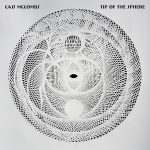
BOB MOULD, Sunshine Rock (CD/LP)
Sunshine Rock, Bob Mould’s latest, shows him continuing to rock hard, very much in the tradition of 2016’s Patch the Sky, but with interesting production moves that give the new album some sonic variety. Mould, now living in Berlin, is best known for being one-third of the seminal alternative band, Hüsker Dü. He went on to form the beloved band Sugar, and has had an impressive, extensive solo career. He has an amazing pop sensibility that he cloaks in the aforementioned guitar-generated waves of noise. Patch the Sky was a bit of a departure, in that Mould gently evolved his familiar sound, taking some of the beloved slop out of his distortion; crafting darker, more complex vocal melodies; and popping the drums out of the mix. The result was a nearly flawless rock album and Sunshine Rock builds on that incredible work. The new wrinkle of Sunshine Rock is the production. Mould features strings at several points throughout the album, giving tracks a grandeur one doesn’t associate with a guy who can command a room with just his voice and an electric guitar. However, that link between Mould’s voice and electric guitar is so baked into the DNA of Sunshine Rock that when he adds things like strings and new wave keyboards (as he does on “Sunny Love Song”), it doesn’t weaken the song. Mould’s fierceness can’t be blunted by classy production. The fierceness isn’t always explicit. On “The Final Years,” the song kicks off with a New Order bass groove with a keyboard riff that would make The Killers proud. Violins kick in halfway through, giving the song an emotional lift. There are no distorted guitars, except that you can almost imagine Mould laying down the chugging song hook on loud electric guitar, and then replacing it with keyboards and violin. The guitar is present in the song, even when it’s subtle in the mix. Sunshine Rock has lots of straight-ahead rock songs, too. “Sin King” has a huge drum sound, with Mould’s guitar and voice striving to climb the immense beat. “What Do You Want Me to Do,” with its relentless guitar hook, background vocals, and huge solo, could almost represent an alternative universe version of Van Halen, had they been driven by wisdom and introspection, rather than sun and parties. At 12 tracks long, and finishing just under 37 minutes, Sunshine Rock is relentless. It’s heavy without being dark. It’s catchy without being light. And while the bones of the album are Mould and his electric guitar, he has very carefully added different touches, like strings and keyboards, that enhance the tracks without being distracting. Sunshine Rock is an album worth hearing.

GALACTIC, Already Ready Already (CD/LP)
The tenth studio album from New Orleans staple Galactic, titled Already Ready Already, is an LP of sounds influenced by their home city and beyond. It scales back a bit from their previous release Into The Deep, this time only showcasing local singers while evolving the core bands funk sound for the future with digital blasts and experimentation. The instrumentals, which open and close the album aptly titled “Already” and “Ready Already”, are blazers and the most rock leaning the band gets; for a group who stays with the funk these are exciting glimpses into a harder sound for the outfit. While the group is notorious for their live sets, they are constantly striving to refine their studio craft. The band (Stanton Moore, Robert Mercurio, Jeff Raines, Richard Vogel, Ben Ellman, Shamarr Allen) has always promoted their home city on record and in practice (recently by purchasing the famed Tipitina’s), and when the music gets rolling they bring some local friends out into the spotlight. Charm Taylor returns (she collaborated with the band on their best song last album “Right On”) for “Clap Your Hands”, a gospel-influenced party jam that Taylor confidently leads. The track uses blaring horns, harmonica, warm organ and layers of beats to move forward, while two other offerings thrust Galactic’s sound into the future even more successfully; “Touch Get Cut” and “Dance At My Funeral.” Erica Falls delivers a badass vocal for “Touch Get Cut”, which whirls together pieces of digital bleeps, NOLA second line, marching drums, and small horn flourishes to support the killer Falls as she claims her space with vocal dominance. “Dance At My Funeral” is the most exciting mix of past New Orleans with 2019 and beyond as rap cabaret artist BOYFRIEND exalts all of her friends to shake their ass while they still can at her funeral in front of a musical backdrop that delivers a swirling mix of aggressive buzzing dance funk. The exhilarating brief blast of a track manages to make time for a mini drum snap and bumping bass/ripping trumpet duet; a true winner. Not everything is as exciting though; “Everlasting Light” is fairly lightweight R&B even with David Shaw and Nahko onboard, while Princess Shaw vocally leads the way through “Straight Crazy”, the most straight ahead pop song the outfit has ever recorded. Moving back into their wheelhouse is the slippery instrumental “Goose Grease”, which the band dives into and explores gracefully. Only eight songs, including brief intro and outro, the album isn’t as rich as past outings (such as the hip-hop experiment From the Corner To The Block, or the gorgeous snapshot of New Orleans music on 2010’s Ya-Ka-May). However, Galactic prove once again on Already Ready Already that they are willing to experiment with fellow Big Easy artists while exploring the dense musical past, present and future of their beloved city.

CASS MCCOMBS, Tip Of The Sphere (CD/LP)
When Cass McCombs started making records in the early 2000s, he was a woodsy abstractionist with an unabashed taste for classic rock, and he soon became a master of vernacular: John Lennon-ish balladry, droning indie-pop, baroque choral soul, ramshackle prog, and — especially — sad-dreamy folk-rock recalling Cali kin Neil Young and Elliott Smith. Fifteen years in, he remains a shapeshifter with excellent taste in shapes. On Tip Of The Sphere, he summons yet another West Coast spirit: Jerry Garcia. As a head who followed the band in their final years, and who was bold enough to cover “Dark Star” on 2016’s Day Of The Dead tribute, McCombs brings a certain amount of authority to the ceremony. But he’s an economical guitarist, and the vibe here is mostly late-Seventies Dead, grooves more burbling than rushing. The opener “I Followed The River South To What” echoes the squishy, envelope-filter guitar voicings of innumerable “Scarlet Begonias/Fire On The Mountain” jams alongside Dan Horne’s paddleboat bass lines, while Dan Lead’s pedal steel on “Prayer For Another Day” and “Rounder” recalls Garcia’s decidedly un-Nashville style. None of this should suggest the approach is overly derivative or slavish. To the contrary, and it takes balls and vision to employ these tropes in a fresh way. See “The Great Pixley Train Robbery,” which begins with an acoustic guitar flourish suggesting a Tommy outtake, then steps into the great 20th century tradition of the train song, following Robert Hunter and many before him. McCombs writes of a railroad heist that actually occurred a century ago in California, narrating it as a confession by a man hoping for closure if not redemption. “I swear before Notary,” he declares, “to make a clean breast/Of the whole thing,” before ripping into a swirling, multi-tracked guitar jam over a snaky Mars Hotel groove. Elsewhere, the matrix of influences pivots. “American Canyon Sutra” suggests Alan Ginsburg and Suicide’s Alan Vega, indicting of our Walmart culture over synth beats, electronic splats, and Funkadelic guitar noise. And “Sleeping Volcanoes” — certain to be referred to as “The Armageddon Song” — scrambles vintage tunecraft with evocations of refugees and class war, its romantic-apocalyptic reprise recalling McCombs’ “Aids In Africa” (from his 2003 debut A) in its unnerving juxtapostion of real-world horror and pleasure-center popcraft. It’s deceptively chill music that, like most of McCombs work, honors the past while steeling itself for the future.
LEMONHEADS, Varshons 2 (CD)
JULIAN MARLEY, As I Am (CD)
MERCURY REV, Bobbie Gentry’s The Delta Sweetie Revisited (CD)
KILLER REISSUES:
PRINCE:
First time on vinyl LP!
3121 (CD/LP)
MUSICOLOGY (CD/LP)
PLANET EARTH (CD/LP)
COMING SOON:
TEDESCHI TRUCKS BAND, Signs (2/15)
SETH WALKER, Are You Open? (2/15)
DALE WATSON, Call Me Lucky (2/15)
RYAN BINGHAM, American Love Song (2/15)
INDIE.ARIE, Worthy (2/15)
And don’t forget these STILL-NEW platters that matter!
GUIDED BY VOICES, Zeppelin Over China (2xCD/2xLP)
After dedicating all of last year to the release and support of one (just one) album, the late-career masterpiece Space Gun, Robert Pollard and his gang plan on upping the ante for 2019 with three LP’s and a slew of EP’s on tap. This is standard operating procedure for Pollard though. Bob still writes a dozen songs before lunch. Now fully comfortable with each other after four albums and extensive touring, this version of the band is muscular and hard-rocking but without forsaking the weirdness that has always been a big part of Pollard’s sonic palette. Once again, this lineup (which includes Doug Gillard, Kevin March, Mark Shue and Bobby Bare, Jr.) attacks each song like it’s the last thing they’ll ever play. The subtle production of Travis Harrison breathes life into songs that already bristle with energy. Unlike its mighty predecessor, Zeppelin has an expansiveness of spirit – similar to (gasp) The White Album. Each of its four sides represents a different side of Guided By Voices but still functions quite well as a unified whole. Side One is the most direct and archetypal. It starts with 69 seconds of brilliance called “Good Morning Sir.” It’s the perfect warmup for the marathon ahead. The first huge hook arrives shortly thereafter with “Carapace.” There’s krautrock feel as the band locks into the groove and refuses to let go. The sludge-filled “Holy Rhythm” closes the side with the most unlikely earworm imaginable. Side Two is the “acoustic” part as many of the songs here are stripped down and slightly folksy. But don’t get confused: two of the best songs on the album reside here and they both slay. “The Rally Boys” shows GbV can rock out even with strings backing them up while “You Own The Night” is yet another one of those perfect songs that Pollard can still crank out with startling regularity. It’s strange arrangement adds enormous power to the final chorus, a chorus I’ve been singing aloud now for days. We might as well call Side Three the Prog side as three of the songs actually hit the three minute mark. The slow burning “Nice About You” has a decidedly Chairs Missing era Wire vibe that I enjoy. “Einstein’s Angel” boasts a lovely melody, interesting chord changes and easily could have been a lost track from Choreographed Man Of War. Later we have Pollard reflect on his hearing loss (which he also addressed on the first Cash Rivers LP) on the aptly-titled “The Hearing Department.” Next up is my personal favorite tune from the set: “Questions Of The Test” – referencing Pollard’s previous job as a fourth grade school teacher, perhaps. With his affected vocals in full effect, the jangling guitars eventually give way to an exuberant explosion of rock ‘n roll, baby. The final side is harder to define but no less enjoyable. Highlights include “Cold Cold Hands” which shows Pollard can still hit the high notes and the gorgeous “We Can Make Music” which borrows some of Space Gun’s orchestrational zeal. “Vertiginous Raft” closes things out quite majestically and, once done, begs the listener for another round – exactly what it should do! One thing that most fans can agree about: Pollard is a master at sequencing. It truly is astounding that Guided By Voices are still at the top of their game. There is no logical explanation. And unlike many of their 90’s contemporaries who likewise reformed, GbV is relevant and releasing material every bit as good as their heyday. Hell, maybe this is their heyday. There is no doubt that this is the most talented group Pollard has ever put together. They seem to be enjoying this and also seem to know how good they are. I’m okay with that. They have earned it. Where, then, to place this monster within the panoply of Pollard releases? It’s heft challenges like August By Cake. It’s sheen and overall quirkiness though align it more closely to Space Gun. And that is a very good thing.
GIRLPOOL, What Chaos Is Imaginary (LP)
From their snarling punk-folk beginnings, the LA duo of Cleo Tucker and Harmony Tividad have always carried a disarming honesty to their music. Across two albums, 2015’s Before The World Was Big and Powerplant in 2017, Girlpool have nestled themselves in a cozy twee-pop corner of light grunge nostalgia and teenage kitchen sink melodrama. What Chaos Is Imaginary has a certain graceful maturity, more so than those previous records, with a laissez-faire slacker rock easy flow that Mac DeMarco fans will enjoy and some inverted alt-folk balladry, delivered with a Jesus & Mary Chain knack for crystalline shoegaze on a cinematic scale – albeit brought into a focus by crisp percussion and shimmering production. “I thought I looked with both my eyes, that life is only half my size,” they pine on “Joseph’s Dad,” showing that despite the more widescreen vision, it’s still all anchored by intimacy and vulnerability. “Everything’s overrated,” the gossamer and heavenly title track concedes, resigned to an anxiety of “rehearsing what’s reality” and “what chaos is imaginary”. The grunge fuzz meets subtle electronica “Chemical Freeze” perhaps makes for the most experimental moment of the record, while “Minute Of Your Mind” best captures the dreamy aesthetic. Highlight “Swamp And Bay” offers a rare hook-laden respite with a country-ish radio jangle and scuzz-rock climax, but everything stays consistently true to the core of the record: a very human and honest partnership, in a universe all of their own.
MANDOLIN ORANGE, Tides Of A Teardrop (CD/LP)
After a 30-second bath of warm acoustic instrumentation, Andrew Marlin opens Mandolin Orange’s sixth album with a few perfectly tone-setting words: “Just like an old friend, kinder than expected…” It’s clear, basically instantaneously, that you’re in for maximum comfort; Tides of a Teardrop is engineered to settle worried minds, slow the blood and lend an empathetic ear. Nothing the North Carolina folk-pop duo does from there contradicts that notion, but Tides of a Teardrop still strikes a deceptively tricky balance: It’s palliative but never boring, sweet but never cloying, worn but never tired. Over these 10 songs, Marlin and bandmate Emily Frantz lay out a bittersweet series of odes to holding precious memories close (“Golden Embers”), seeking protection from others (“The Wolves”), slowing down and letting life come to you (“Time We Made Time”), and so on. These are songs about life lessons that feel lived-in and hard-won. Each of Mandolin Orange’s stories gets told amid a soft-focus arrangement that occasionally welcomes in a sweep of strings or sprightly flecks of the band’s titular instrument. No matter how they’re dispensed, every note seems to sweep in and out on a reassuring breeze — just like an old friend, kinder than expected.
BEIRUT, Gallipoli (CD/LP)
When 19-year-Old Zach Condon first sent the music he’d been making in his bedroom out into the world, people claimed it as their own, having never heard a trumpet, flugelhorn, ukulele, mandolin, accordion and piano combine to such wonderful effect ever before. This outright devotion to Beirut’s trademark sound meant that any major changes to it would leave some upset, something Zach Condon was acutely aware of when he decided to ditch his much-loved farziza organ after album number two: “I was almost paranoid of what people’s reactions to whatever I put out next would be…I knew I was heading down different roads than before.” In album number five Beirut have arrived on a sound that’s sure to please everyone, a distillation of the best of the Beirut sound and by far their best record yet. As Condon puts it himself “it’s a cathartic mix of all the old and new records and seemed to return me to the old joys of music as a visceral experience”, and that joy is evident from the outset. If one song was to epitomise everything that’s great about Gallipolli, it would be “Varieties of Exile”. The song starts simply enough, but once the instrumentation behins to swell, Condon takes a vocal backseat, gliding effortless, wordless notes over the arrangement. There’s a real freedom here. In all Galipolli is the sound of one of our most talented musicians rediscovering his love for what he was born to do. It’s Zach Condon’s career highlight so far and shows that he’s at his best when he enjoys making music and cares less about what critics and fans might think of it. Long may it continue.







